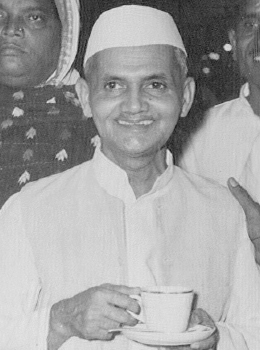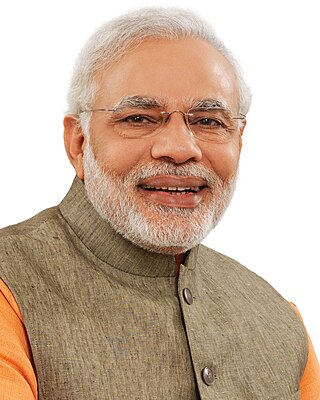
Manmohan Singh is an Indian retired politician, economist, academician and bureaucrat who served as the 13th Prime Minister of India from 2004 to 2014. He is the fourth longest-serving prime minister after Jawaharlal Nehru, Indira Gandhi and Narendra Modi. A member of the Indian National Congress, Singh was the first Sikh prime minister of India. He was also the first prime minister since Jawaharlal Nehru to be re-elected after completing a full five-year term. Singh is also regarded as the most educated prime minister of India.

Ramaswamy Venkataraman was an Indian lawyer, Indian independence activist and politician who served as a Union Minister and as the eighth president of India. Venkataraman was born in Rajamadam village in Tanjore district, Madras Presidency. He studied law and practised in the Madras High Court and the Supreme Court of India. In his young age, he was an activist of the Indian independence movement and participated in the Quit India Movement. He was appointed as the member of the Constituent Assembly and the provisional cabinet. He was elected to the Lok Sabha four times and served as Union Finance Minister and Defence Minister. In 1984, he was elected as the seventh vice president of India and in 1987, he became the eighth President of India and served from 1987 to 1992. He also served as a State minister under K. Kamaraj and M. Bhaktavatsalam.

The Chief of the Army Staff (COAS) is a statutory office held by the professional head of the Indian Army (IA), the land forces branch of the Indian Armed Forces. Customarily held by a four-star general officer, the COAS is the senior-most operational officer of the IA, tasked with the roles of overseeing the overall functioning of the force during peace and wartime, committing to the preparation-cum-maintenance of the force's operational effectiveness and defending the nation's territorial integrity-cum-sovereignty. Also a permanent member of the Chiefs of Staff Committee (COSC) and the National Security Council (NSC), the COAS also bears the responsibility of advising the nation's civilian leadership i.e., the Government of India on all matters privy to the IA.

The Cabinet Secretariat is responsible for the administration of the Government of India. It provides secretarial assistance to the Cabinet of India and facilitates smooth transaction of business between Ministries and Departments of the Government. It functions from the Rashtrapati Bhavan on Raisina Hill in New Delhi.

The Chief of the Air Staff (CAS) is a statutory office held by the professional head of the Indian Air Force (IAF), the aerial branch of the Indian Armed Forces. Customarily held by a four-star air chief marshal, the CAS is the senior-most operational officer of the IAF, mandated with the responsibilities of supervising the force's overall functioning during states of peace and wartime, committing to the establishment-cum-continuity of air deterrence and executing India's security objectives vis-à-vis the preservation of the country's air sovereignty. Also a permanent member of the Chiefs of Staff Committee (COSC) and the National Security Council (NSC), the CAS also bears the responsibility of advising the nation's civilian leadership i.e., the Government of India on all matters privy to the IAF.

The Chief of the Naval Staff (CNS) is the office of the professional head of the Indian Navy (IN), the naval branch of the Indian Armed Forces. Customarily held by a four-star admiral, the CNS is the senior-most operational officer of the IN, tasked with the roles of supervising the force's overall functioning during peace and wartime, along with the execution of India's strategic maritime objectives, namely, the defence of the country's maritime sovereignty around its territorial waters, and the realization of both its domestic-cum-international security interests vis-à-vis maritime vigilance across international sea lines. Also a permanent member of the Chiefs of Staff Committee (COSC) and the National Security Council (NSC), the CNS also bears the responsibility of advising the nation's civilian leadership i.e., the Government of India on all matters privy to the IN.

The Western Naval Command is one of the three command–level formations of the Indian Navy. It is headquartered in Mumbai, Maharashtra. As the senior–most of the three formations, the command is responsible for the all naval forces in the Arabian Sea and western parts of the Indian Ocean and the naval establishments on the west coast of India.

Nirmala Sitharaman is an Indian economist, politician and a senior leader of the Bharatiya Janata Party (BJP) serving as the Minister of Finance and Minister of Corporate Affairs of the Government of India since 2019. She is a member of the Rajya Sabha, the upper house of the Indian Parliament, representing Karnataka since 2016 and previously represented Andhra Pradesh from 2014 to 2016. Sitharaman previously served as the 28th Defence Minister from 2017 to 2019, thereby becoming India's second female defence minister and the second female finance minister after Indira Gandhi, and the first full-time female minister to hold each of those portfolios. She served as junior minister in the Modi ministry between 2014 and 2017, holding successive positions, first for her dual appointment as the Minister of State in the Ministry of Finance and the Minister of State in the Ministry of Corporate Affairs from May to November 2014, and then as the Minister of State for the Ministry of Commerce and Industry from May 2014 to September 2017, before being elevated to senior posts within the Union Cabinet.

The Chief of the General Staff, India was a senior military commander in the British Indian Army from 1906 to 1947, and in the independent Indian Army from 1947 until 1965.

Lal Bahadur Shastri was sworn in as Prime Minister of India on 9 June 1964. In his ministry, the ministers were as follows.

The First Narendra Modi ministry is the Council of Ministers headed by Narendra Modi that was formed after the 2014 general election which was held in nine phases from 7 April to 12 May in 2014. The results of the election were announced on 16 May 2014 and this led to the formation of the 16th Lok Sabha. The Council assumed office from 27 May 2014.

Jawaharlal Nehru was sworn in as Prime Minister of India on 15 August 1947. After first Indian general election, Nehru became the first democratically elected Prime Minister of the country and his second term started on 15 April 1952. In his ministry upon reelection, the ministers were as follows.

The Vice Chief of the Army Staff (VCOAS) is a statutory position in the Indian Armed Forces usually held by a three star lieutenant general. As the second highest-ranking officer to serve in the Indian Army, the VCOAS is the deputy professional head of the Indian Army and a senior adviser to the Minister of Defence. The office holder is usually the second most senior army officer unless the Chief of Defence is an army officer.

The Fourth Jawaharlal Nehru ministry was formed on 2 April 1962 after the Indian National Congress won the 1962 general election.

Rajiv Gauba is an Indian civil servant serving as the current Cabinet Secretary of India since 2019. He is an Indian Administrative Service (IAS) officer belonging to the 1982 batch of Jharkhand cadre. Prior to his appointment as Cabinet Secretary, he was Home Secretary of India. His tenure as the Cabinet Secretary of India has been extended 4 times by 1 year durations by the Appointment Committee of the Cabinet (ACC) which is chaired by the Prime Minister of India

Flag Officer Commanding Western Fleet (FOCWF) is the title of the Indian Navy Officer who commands the Western Fleet, headquartered in Mumbai, Maharashtra. The FOCWF is a two star admiral holding the rank of Rear Admiral. The appointment is considered to be an important and a coveted one. The Current FOCWF is Rear Admiral C. R. Praveen Nair, who assumed office on 10 November 2023.

The First Gulzarilal Nanda ministry was formed as an acting cabinet upon the death in office of Jawaharlal Nehru on 27 May 1964.

The Chief of Personnel (COP) in the Indian Navy is a senior appointment in the rank of Vice-Admiral. As a Principal Staff Officer (PSO) at Naval Headquarters (NHQ), the COP is responsible for personnel-related matters. The present COP is Vice-Admiral Krishna Swaminathan, who was appointed on 6 October 2023.

The Second Gulzarilal Nanda ministry was formed as an acting cabinet upon the death in office of Lal Bahadur Shastri on 11 January 1966.

















